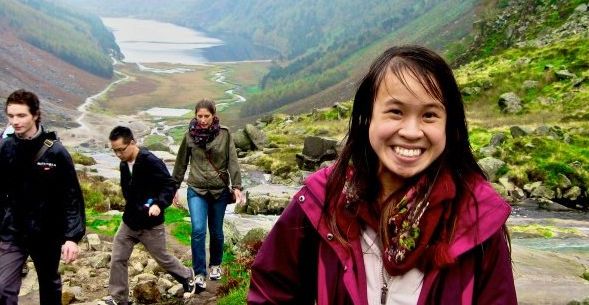
What was your major?
I originally came to UT as a Business and Economics major, but have since meandered through three different Colleges and six different majors. Somewhere along this path, I was lucky enough to discover two very different but incredible majors: Rhetoric and Writing and Honours Biology.
Why did you join Polymathic Scholars?
Like with many of the great opportunities I’ve had in my life, I just kind of stumbled onto Polymathic Scholars by happenstance. But once I crossed Madison’s door, and he gave me the PS pitch, I was sold.
I was immediately attracted by the idea of being able to marry my many disparate interests and create something novel—something I could call my own. I think the reason I swept through so many different majors was that I felt that none of them fitted me. Even though when I first joined Polymathic Scholars I had no idea what would “fit me,” I knew the program would help me find it – and it did! Polymathic Scholars gave me the autonomy I sought for my education and encouraged me to explore the many avenues that the university had to offer. It’s not surprising that I happily and comfortably settled into my two current majors soon after joining.
What was your topic for PS, and what disciplines did it combine?
My PS topic is called “The Politics of Science,” and it examines how the human, or rhetorical, elements of science are often hidden from the public eye. Empirical data must always be interpreted, consolidated, and communicated through some form of human intervention— making the sciences a human endeavor prone to the error inherent in all human endeavors. This is not necessarily a fault of science, but it is an inherent characteristic that should be appropriately conveyed. I strongly believe that much of the scientific information that does make it to the public rarely contains the context and caveats necessary for interpreting and understanding scientific data. My main objective for this field is to develop methods to accurately portray the scientific process to the general public, so that they can not only be comfortable with the ambiguity inherent in science, but also become a critical audience of it.
This topic somehow managed to combine my two disparate majors, science and rhetoric, as well as other fields that I enjoy such as law, government, history, and philosophy.
How did you become interested in your PS topic?
When I came into the sciences, I had this particular impression of what it sought to do — an impression that I think many people still hold. I had imagined science as this objective search for verifiable, capital T-Truths. Luckily, in my first year with the sciences I had an amazing mentor who showed me that science is not driven forward by certain truths, but rather by the uncertainty that always lies behind scientific knowledge. He taught me to appreciate and use this uncertainty that continually encourages us to push forward — refining what we know about the world – but always understanding that we are limited by our scope. He taught me how to become comfortable with the fact that absolute certainty will always elude us. “The more you learn, the more your realize how little you know,” he would say. He not only changed the way I approached the sciences, but also how I approached the complexity of life. Because once I was able to become comfortable with the uncertainty inherent in both, I was willing (and eager) to jump into new experiences — whether it be joining a new laboratory or exploring new countries.
Do you have any advice for other Polymaths on how to make the most of the program?
My most pragmatic advice would be to take advantage of all the wonderful and brilliant faculty members that actively involve themselves with the program. Having a dedicated mentor to stimulate your research interest and provide you with guidance can do absolute wonders for your undergraduate education and personal development.
My more quixotic advice is not to put so much pressure on finding the “perfect” PS topic. Your topic doesn’t have to be your only interest or even your biggest interest (though it does help), but one that motivates you to do research that you’d be proud of conducting once you graduate. Some students put a lot of pressure to find the topic, but I think it’s important to remember that the PS program is giving you the skills to think critically and conduct novel research so that you can continue asking questions and being curious for the rest of your life. That is an immeasurably valuable skill set, so just jump in, learn, and enjoy!














